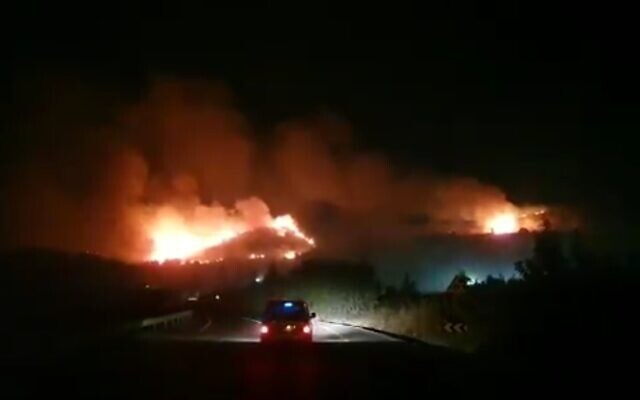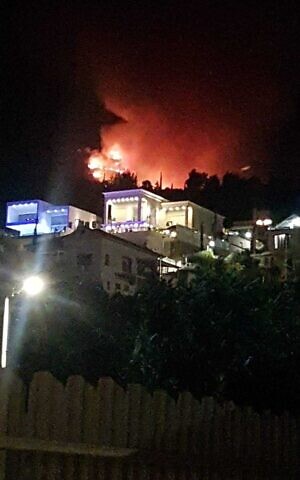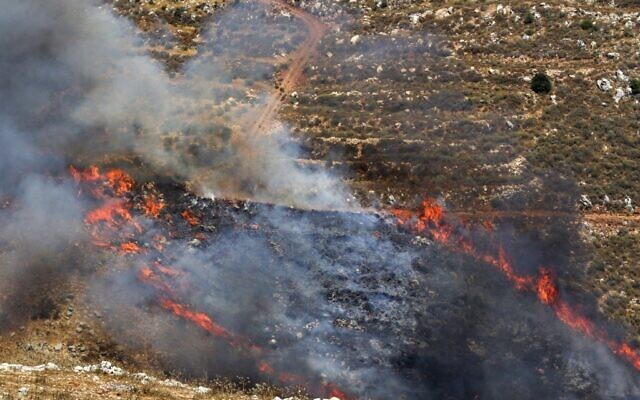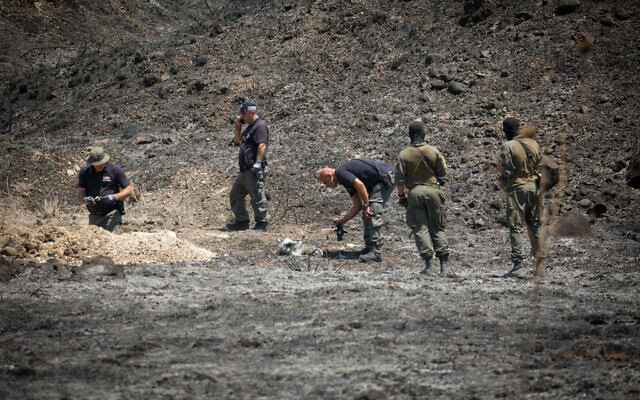Firefighters extinguish one fire but second persists, forcing kibbutz to shut entrance; US slams rocket attack, as Israel weighs harsher response but fears harm to local tourism

The IDF renewed retaliatory strikes at military targets in Lebanon late Wednesday, in response to rocket fire, which sparked fires that were still tearing through forested hillsides in northern Israel some 12 hours later.
Israeli fighter jets targeted the Lebanese border areas from which the rocket fire originated in addition to other terror infrastructure, the army said. The air force also struck a site that was used to fire rockets at Israel in the past.
The Hezbollah-affilated al-Manar reported Israeli jets struck an area in the outskirts of the southern Lebanese town of Aishiya.
“IDF attacks will continue and even intensify in the face of terror attacks against the State of Israel and its citizens,” the army said in a statement.
The IDF said it held “the country of Lebanon” responsible for attacks originating from its sovereign territory, which took place as the government in Beirut undergoes its worst economic crisis in decades with the country on the brink of collapse.
On the Israeli side of the border, firefighters were still battling blazes sparked by two of three rockets fired from Lebanon shortly after noon on Wednesday. The third fell short of the border.
IDF publishes footage of the airstrikes conducted in southern Lebanon earlier tonight pic.twitter.com/uNAbWWPEMT
— Emanuel (Mannie) Fabian (@manniefabian) August 5, 2021
The Ramim Ridge west of the northern city of Kiryat Shmona was still awash in flames late that night, leading authorities to order the entrance to nearby Kibbutz Margaliot closed off.
A second blaze inside Kiryat Shmona was extinguished earlier in the day, but together the two fires already destroyed hundreds of acres of forest and scrubland, according to Hebrew media reports.
A spokesman for the Fire and Rescue service confirmed that the Ramim Ridge blaze was still going as of midnight.
A message sent to Kiryat Shmona residents by the city said the fire was not a threat to homes abutting the bottom of the hillside.
But a local official told Army Radio that officials feared the blaze could jump the fire line toward Kiryat Shmona.
השריפה ברכס רמים שבגליל העליון, שפרצה עקב נפילת הרקטות, ממשיכה להשתולל. הכניסה למושב מרגליות נחסמה@rubih67
(צילום: אלכס גיינר) pic.twitter.com/JjqHwfzxbZ— כאן חדשות (@kann_news) August 4, 2021
“The fire is still not under control. It was very hard for us to reach in real time, and managed to spread,” said Benny Ben-Muvhar, head of the Mevo’ot Hermon Regional Council.
Video showed one of the rockets impacting just a few hundred yards from a Shufersal grocery store on the northeastern edge of Kiryat Shmona, near the city’s cemetery.
“I was just carrying on with my day when suddenly there was a siren and an impact, both at the same time,” a local resident told the Kan public broadcaster. He said the rocket “fell 200 meters from us.”
The second rocket apparently struck the Ramim hillside.
It was not clear why the Iron Dome anti-missile system, which had previously been deployed in the region, was not activated to intercept the rocket fire.
There were no reports of casualties in the attack, though the Magen David Adom emergency medical service treated four people for anxiety attacks.
Israel responded by firing some 100 artillery rounds into Lebanon in three rounds over the course of Wednesday.
A Lebanese army official said the military had no comment pending investigations. An army official told Reuters that the Israeli shelling had sparked a fire near the town of Rashaya al-Fokha.
Israeli officials were mulling expanding the military response Wednesday, but feared pressing the conflagration could keep visitors from traveling north during the height of tourist season, the Kan broadcaster reported.
Asaf Langleben, head of civilian security for the northern Galilee region, told Army Radio that the rockets hit in peak tourism season.
“This was a surprise to us, but not something we didn’t think could happen,” he said.
While authorities did not issue any special instructions for residents and said activities could continue as normal, Kiryat Shmona opened up public bomb shelters as a precaution. Residents of the city told Channel 12 news that the rocket fire had already managed to scare people away.
“Nobody is outside, you can see, the whole Kiryat Shmona. We have a few tourists, who we wait all year for,” area resident Shimon Dahan told the channel.
No group has claimed responsibility for the rocket fire.

According to Hebrew media reports, Israeli defense officials believe local armed Palestinian groups had fired the rockets, and not the Shiite terror group Hezbollah.
The reports, which were unsourced and likely based off leaked military assessments, indicated that Jerusalem saw the groups as acting without even the tacit okay of Hezbollah, though Channel 13 news reported that Israel believes the Iranian proxy group is powerful enough to tamp down on rocket fire if it wants to.
The US spoke out against the rocket fire Wednesday.
“We absolutely condemn the rocket attacks from armed groups based in Lebanon that were fired into Israel,” State Department Spokesman Ned Price said.
“Israel has the right to defend itself against such attacks,” he told reporters in Washington, adding that the US would remain engaged with partners “in the region in an effort to de-escalate the situation.”

UNIFIL, the UN peacekeeping force dispatched to maintain calm along the volatile border called for both sides “to exercise maximum restraint to avoid further escalation, especially on this solemn anniversary,” referring to the massive blast at a Beirut port exactly one year ago, which destroyed large swaths of the city and which some have blamed on Hezbollah negligence.
Rocket fire from Lebanon has been exceedingly rare in the 15 years since the 2006 Second Lebanon War Israel fought against Hezbollah, though it has occurred sporadically. Recent months, however, have seen a slight uptick, with 10 launches aimed at Israel during May’s 11-day war in Gaza, as well as last month, leading to fears among some that the phenomenon could become more common, as has happened in areas on the Gaza border.
Israel has conveyed to Lebanon via UN peacekeepers that it could intensify its response if calm is not returned to the border.
“Without getting into the identity of who shot the rockets, it’s clear that the the Lebanese government bears full responsibility for any fire at the State of Israel’s territory,” the IDF said in a Hebrew-language statement. “The Lebanese state is lacking control over terror groups operating within it.”
As reported by The Times of Israel
